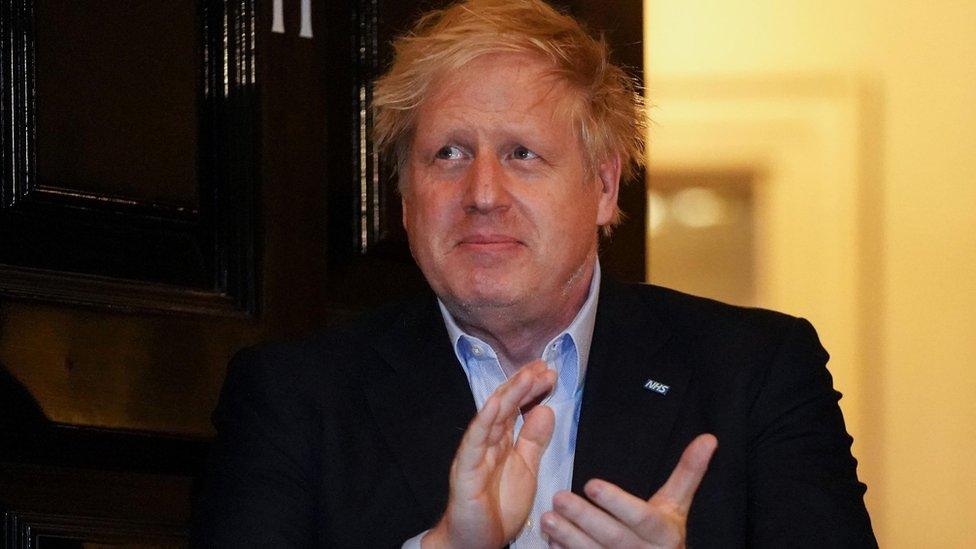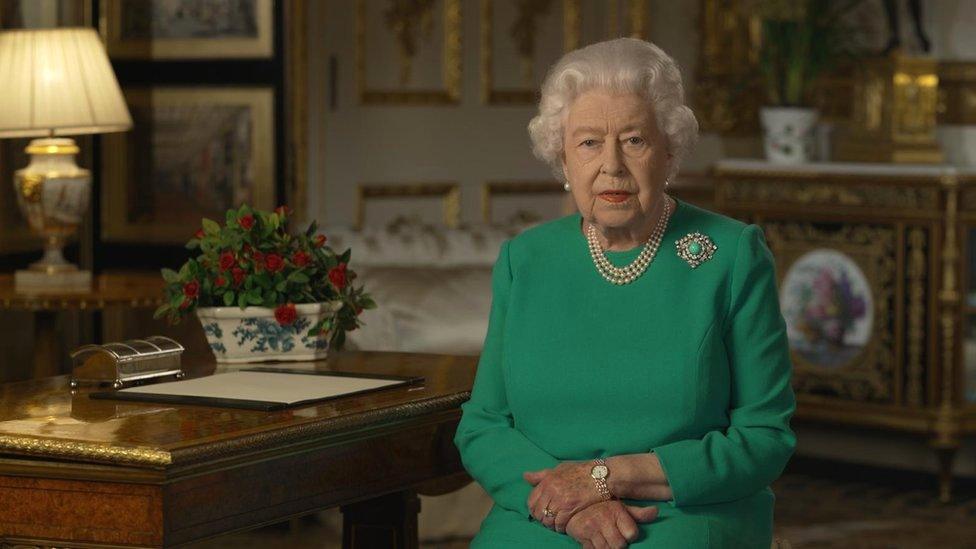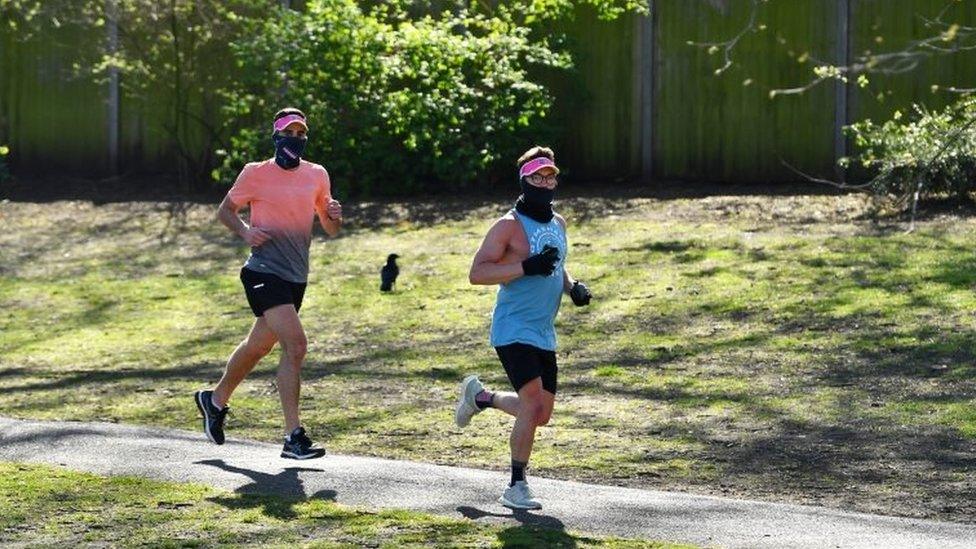Coronavirus: Boris Johnson admitted to hospital over virus symptoms
- Published

The PM took part in the clap for carers on Thursday outside No 11 Downing Street
Prime Minister Boris Johnson has been admitted to hospital for tests, 10 days after testing positive for coronavirus, Downing Street has said.
He was taken to a London hospital on Sunday evening with "persistent symptoms" - including a temperature.
It is said to be a "precautionary step" taken on the advice of his doctor.
The prime minister remains in charge of the government, but the foreign secretary is expected to chair a coronavirus meeting on Monday morning.
Mr Johnson, 55, spent the night in hospital and is having what has been described as a series of "routine tests".
In a statement, a Downing Street spokeswoman said: "On the advice of his doctor, the prime minister has tonight been admitted to hospital for tests.
"This is a precautionary step, as the prime minister continues to have persistent symptoms of coronavirus 10 days after testing positive for the virus."
She added: "The prime minister thanks NHS staff for all of their incredible hard work and urges the public to continue to follow the government's advice to stay at home, protect the NHS and save lives."

A SIMPLE GUIDE: How do I protect myself?
AVOIDING CONTACT: The rules on self-isolation and exercise
LOOK-UP TOOL: Check cases in your area
MAPS AND CHARTS: Visual guide to the outbreak

US President Donald Trump began a White House press briefing by sending "our nation's well wishes" for Mr Johnson's "own personal fight with the virus".
"All Americans are praying for him. He's a great friend of mine, a great gentleman and a great leader," Mr Trump said, adding that he was sure the prime minister would be fine because he is "a strong person".
Labour leader Keir Starmer also wished Mr Johnson well, saying he hoped for a "speedy recovery".

Coronavirus is straining the highest levels of government

The prime minister, alongside the Queen, personifies the country's public response to this pandemic.
And Boris Johnson is continuing to personally experience the unpleasant reality of the virus.
Downing Street officials are adamant Mr Johnson remains in charge of the government and is in contact with ministerial colleagues and civil servants.
But the undeniable reality is there is nothing conventional, nothing normal about this - however routine the tests are that the prime minister is receiving.
The coronavirus has repeatedly proven its capacity to turn the far-fetched into reality, over and over again.
Advisers, officials and ministerial colleagues have all been forced to self-isolate.
Covid-19, the illness which the virus causes, is crippling the economy, robbing us of our usual liberties - and now it is straining the personal capacity of those at the highest level of government to respond to it.

Dr Sarah Jarvis, a GP and broadcaster, told the BBC that Mr Johnson would be likely to have his chest X-rayed and his lungs scanned, particularly if he had been struggling for breath.
She said he is also likely to have an electrocardiogram to check his heart's function, as well as tests on his oxygen levels, white blood cell count, and liver and kidney function before he is released from hospital.
Mr Johnson has worked from home since it was announced that he had tested positive for coronavirus on 27 March.
He was last seen in public applauding the NHS and other key workers from his flat in Downing Street on Thursday evening, and chaired a coronavirus meeting remotely on Friday morning.
Also on Friday, the prime minister posted a Twitter video in which said he was still displaying minor symptoms.
Boris Johnson posted a video message on Friday
"I still have a temperature. So in accordance with government advice I must continue my self isolation until that symptom itself goes," he said.
"But we're working clearly the whole time on our programme to beat the virus."
On Saturday, his pregnant partner Carrie Symonds tweeted that she has spent a week in bed with the main symptoms.
She said she had not been tested for the virus.
Health Secretary Matt Hancock had also tested positive for the virus and returned from self-isolation on Thursday to host the daily Downing Street news conference.
The government's chief medical adviser, Prof Chris Whitty, has also had to self-isolate after showing symptoms.
Last month, the prime minister's spokesman said if the prime minister was unwell and unable to work, Foreign Secretary Dominic Raab, as the first secretary of state, would stand in.
The news of Mr Johnson's admission to hospital came shortly after the Queen delivered a rallying message to the nation, saying the UK "will succeed" in its fight against the coronavirus pandemic.
In a rare speech, the monarch thanked people for following government rules to stay at home and praised those "coming together to help others".
In other developments:
Scotland's chief medical officer has resigned after making two trips to her second home - despite government guidance urging people to avoid unnecessary travel
The National Domestic Abuse helpline has seen a 25% increase in calls and online requests for help since the lockdown, the charity Refuge says
High street pharmacists are "needlessly being put at risk" due to a lack of personal protective equipment (PPE), the Royal Pharmaceutical Society says
Young workers and the worst paid are the most likely to be affected by the closure of businesses because of coronavirus, according to research by the Institute for Fiscal Studies
On Sunday the Department of Health said 621 more people had died in hospital in the UK after testing positive for coronavirus, taking the total death toll to 4,934.
As of 09:00 BST on Sunday, 47,806 people had tested positive for coronavirus, the department said.

How have you been affected by the issues relating to coronavirus? Share your experiences by emailing haveyoursay@bbc.co.uk, external.
Please include a contact number if you are willing to speak to a BBC journalist. You can also contact us in the following ways:
WhatsApp: +44 7756 165803
Tweet: @BBC_HaveYourSay, external
Send pictures/video to yourpics@bbc.co.uk, external
Please read our terms & conditions and privacy policy
Related topics
- Published5 April 2020

- Published5 April 2020
